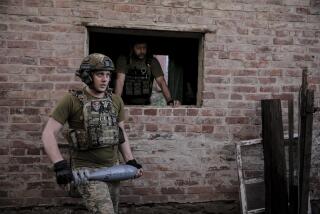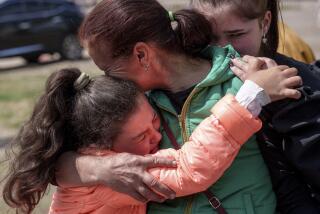Russian Vote Means Military Has Public’s Go-Ahead to Wage Chechen War
- Share via
MOSCOW — The armed forces did not receive a single vote in Russia’s parliamentary elections; they did not even have a place on the ballot. But they emerged Monday from the nationwide vote as one of the biggest winners, receiving a clear mandate from the public to pursue their brutal war in Chechnya.
As artillery and warplanes rained shells and bombs on Grozny, the Chechen capital, major political parties supporting the military received three-quarters of the vote. Yabloko, the only antiwar party out of 26 on the ballot, won just 6% and, as a result, will lose half the seats it now holds in the Duma, parliament’s lower house.
The killing of hundreds of civilians in the separatist southern republic has brought harsh international criticism of Russia, but the outpouring of support for the war among ordinary Russians will strengthen the military’s position within the country’s ruling circle and give the generals a free hand in conducting the war, military analysts said.
Even before all the votes had been counted Monday, military officials said they planned to begin an operation as early as Wednesday to “liberate” Grozny from thousands of rebel fighters holding the city, Russian television station ORT reported.
So far in the Chechen campaign, the armed forces have tried to avoid engagements that might result in a large number of military casualties. With the parliamentary balloting finished and the presidential election still six months away, this may be the time for the military to take greater risks.
“Now that the parliamentary elections are over, the Kremlin’s hands are no longer tied,” said Alexander I. Zhilin, military analyst for the Moskovskiye Novosti newspaper. “Before the elections, the Kremlin had to carefully watch what it was doing in Chechnya--it could not afford huge losses among the military and civilians. Now, the Kremlin administration can order the troops to do whatever they like in Chechnya.”
Two weeks ago, Russian warplanes dropped leaflets on Grozny warning as many as 50,000 civilians in the city to flee or die in heavy shelling. Some civilians left, but many thousands remain, officials say.
Despite international outrage over the threat, Russia has been pounding the city with shells and bombs since Saturday in apparent preparation for an attempt to attack rebels there. Russian generals have said they intend to hoist the Russian flag above Grozny before Jan. 1.
The city was the scene of a horrendous battle over the New Year’s holiday in 1995, when ill-prepared Russian troops stormed it and were slaughtered by Chechen rebels lying in wait. Russian forces eventually seized the city, but the large number of casualties helped turn the public against the war, which ended in 1996 with a Chechen victory.
In the current conflict, now 2 1/2 months old, Russian officers have been more cautious about exposing their troops to enemy fire. Critics say Russia helps maintain public support for the war by vastly underreporting the number of Russian soldiers killed in the campaign.
On Monday, troops were fighting on the northern, eastern and southern outskirts of Grozny. Russian officials said their troops had seized the Severny airport outside the capital and that the forces now control 134 cities, towns and villages in Chechnya.
Russia’s top brass repeatedly has said it has no plans to storm Grozny this time around. The foray into the city, which is planned to begin sometime between Wednesday and Friday, reportedly will rely on special forces troops and a unit of 150 volunteers commanded by Beslan Gantamirov, a former Grozny mayor.
Gantamirov was convicted of embezzling federal funds meant for the city’s restoration after the 1994-96 war. He was pardoned by Russian President Boris N. Yeltsin in October and released early from prison on the condition that he go to Chechnya and organize local militias to fight alongside federal troops.
Military and political analysts said they believe that the strong showing of support for the war in Sunday’s elections will prompt Prime Minister Vladimir V. Putin to take more aggressive action against the rebels.
Pavel Y. Felgengauer, military expert with the newspaper Sevodnya, said the victory of the pro-war forces in the parliamentary elections is a tribute to the Kremlin’s propaganda machine and its ability to suppress bad news about the war.
He predicted that the results will convince Putin that he can continue to control public opinion while escalating the war, and then coast to victory in next year’s presidential election.
“With the results of the ballot, Putin’s hands are free,” Felgengauer said. “Putin will never yield to the demands of the West to stop the war because it would ruin his image and consign his presidential ambitions to the grave. The massacre will continue.”
But Andrei A. Piontkovsky, director of the Moscow-based Independent Institute for Strategic Studies, said Putin’s chances of succeeding Yeltsin will depend on a steady flow of positive reports from the front, which could be difficult to sustain all the way up to the June election.
“The entire presidential campaign will be built around the war in Chechnya, and in order to keep it rolling, federal troops will have to storm a village a week,” Piontkovsky said. “The problem is that there is not much left of Chechnya already. So, dragging it all out for another six months could become very problematic.”
More to Read
Sign up for Essential California
The most important California stories and recommendations in your inbox every morning.
You may occasionally receive promotional content from the Los Angeles Times.













